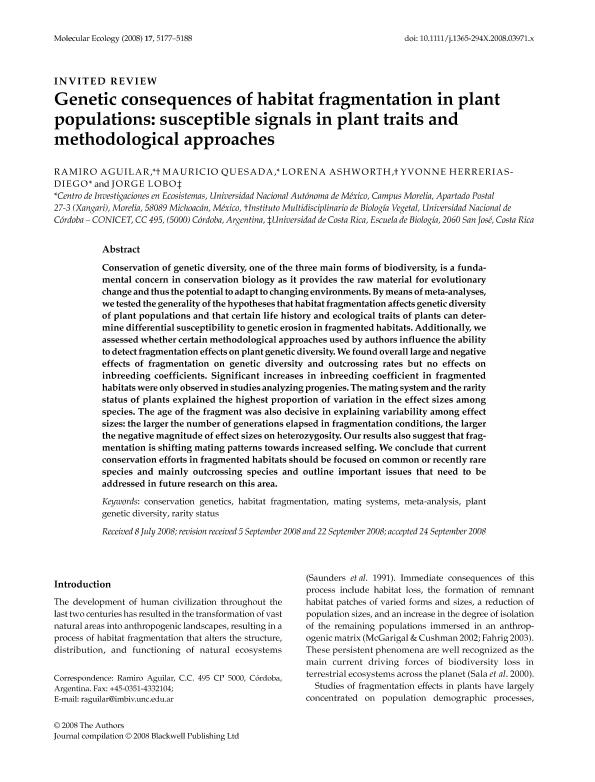Mostrar el registro sencillo del ítem
dc.contributor.author
Aguilar, Ramiro

dc.contributor.author
Quesada, Mauricio
dc.contributor.author
Ashworth, Lorena

dc.contributor.author
Herrerias Diego, Yvonne
dc.contributor.author
Lobo, Jorge
dc.date.available
2017-11-01T16:30:49Z
dc.date.issued
2008-12
dc.identifier.citation
Aguilar, Ramiro; Quesada, Mauricio; Ashworth, Lorena; Herrerias Diego, Yvonne; Lobo, Jorge; Genetic consequences of habitat fragmentation in plant populations: susceptible signals in plant traits and methodological approaches; Wiley Blackwell Publishing, Inc; Molecular Ecology; 17; 24; 12-2008; 5177-5188
dc.identifier.issn
0962-1083
dc.identifier.uri
http://hdl.handle.net/11336/27319
dc.description.abstract
Conservation of genetic diversity, one of the three main forms of biodiversity, is a fundamental concern in conservation biology as it provides the raw material for evolutionary change and thus the potential to adapt to changing environments. By means of meta-analyses, we tested the generality of the hypotheses that habitat fragmentation affects genetic diversity of plant populations and that certain life history and ecological traits of plants can determine differential susceptibility to genetic erosion in fragmented habitats. Additionally, we assessed whether certain methodological approaches used by authors influence the ability to detect fragmentation effects on plant genetic diversity. We found overall large and negative effects of fragmentation on genetic diversity and outcrossing rates but no effects on inbreeding coefficients. Significant increases in inbreeding coefficient in fragmented habitats were only observed in studies analyzing progenies. The mating system and the rarity status of plants explained the highest proportion of variation in the effect sizes among species. The age of the fragment was also decisive in explaining variability among effect sizes: the larger the number of generations elapsed in fragmentation conditions, the larger the negative magnitude of effect sizes on heterozygosity. Our results also suggest that fragmentation is shifting mating patterns towards increased selfing. We conclude that current conservation efforts in fragmented habitats should be focused on common or recently rare species and mainly outcrossing species and outline important issues that need to be addressed in future research on this area.
dc.format
application/pdf
dc.language.iso
eng
dc.publisher
Wiley Blackwell Publishing, Inc

dc.rights
info:eu-repo/semantics/openAccess
dc.rights.uri
https://creativecommons.org/licenses/by-nc-sa/2.5/ar/
dc.subject
Genetic Diversity
dc.subject
Inbreeding
dc.subject
Mating Systems
dc.subject
Rarity Status
dc.subject.classification
Bioquímica y Biología Molecular

dc.subject.classification
Ciencias Biológicas

dc.subject.classification
CIENCIAS NATURALES Y EXACTAS

dc.title
Genetic consequences of habitat fragmentation in plant populations: susceptible signals in plant traits and methodological approaches
dc.type
info:eu-repo/semantics/article
dc.type
info:ar-repo/semantics/artículo
dc.type
info:eu-repo/semantics/publishedVersion
dc.date.updated
2017-10-18T14:53:16Z
dc.identifier.eissn
1365-294X
dc.journal.volume
17
dc.journal.number
24
dc.journal.pagination
5177-5188
dc.journal.pais
Estados Unidos

dc.description.fil
Fil: Aguilar, Ramiro. Consejo Nacional de Investigaciones Científicas y Técnicas. Centro Científico Tecnológico Conicet - Córdoba. Instituto Multidisciplinario de Biología Vegetal. Universidad Nacional de Córdoba. Facultad de Ciencias Exactas Físicas y Naturales. Instituto Multidisciplinario de Biología Vegetal; Argentina
dc.description.fil
Fil: Quesada, Mauricio. Universidad Nacional Autónoma de México; México
dc.description.fil
Fil: Ashworth, Lorena. Consejo Nacional de Investigaciones Científicas y Técnicas. Centro Científico Tecnológico Conicet - Córdoba. Instituto Multidisciplinario de Biología Vegetal. Universidad Nacional de Córdoba. Facultad de Ciencias Exactas Físicas y Naturales. Instituto Multidisciplinario de Biología Vegetal; Argentina
dc.description.fil
Fil: Herrerias Diego, Yvonne. Universidad Nacional Autónoma de México; México
dc.description.fil
Fil: Lobo, Jorge. Universidad de Costa Rica; Costa Rica
dc.journal.title
Molecular Ecology

dc.relation.alternativeid
info:eu-repo/semantics/altIdentifier/url/http://onlinelibrary.wiley.com/doi/10.1111/j.1365-294X.2008.03971.x/abstract
dc.relation.alternativeid
info:eu-repo/semantics/altIdentifier/doi/http://dx.doi.org/10.1111/j.1365-294X.2008.03971.x
Archivos asociados
